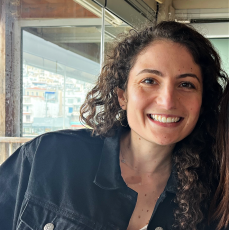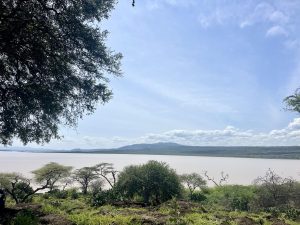The landscape of Kiserian was beautiful—a stunning view of Lake Baringo and the surrounding mountains. The vegetation was green, tall, and abundant. Despite its beauty, we soon learned that these were weeds and poisonous for cattle. In fact, edible grass had stopped growing in several areas and has been replaced by leafy, poisonous weeds. When we go back to Kiserian later this month, I hope to find out the name (though it may not be in the local IlChamus language).
This example of biodiversity loss (exacerbated by climate change) has had a drastic impact on cattle, which these pastoralists are dependent upon for their livelihoods. Herders reported that when cows eat these weeds, their milk becomes abnormal and tastes different. As a result, those who consume the milk may get sick. Furthermore, herders will have a difficult time selling this milk at the market.
In line with this change in biodiversity, herders of both tribes lamented over an overall decrease in pastureland. For example, Lake Baringo was previously located 5-6km away from the IlChamus’ residential area in Kiserian. This primary water source had complimented the adjacent pastureland, whereby cows could graze and drink water in without traveling a far distance.
However, due to the Lake Baringo’s “rapid expansion” in 2019, ten square meters of pastureland has been washed over. While Lake Baringo has experienced periods of flooding for decades, it has doubled in area since 2010 and impacted 400,000 people. Climate change may be the largest contributor to lake expansion, while geologists also recognize additional causes such as land use changes that have “accelerated runoff and caused sediment to build up on lake bottoms.” As a result of the floods, IlChamus herders have had to take their animals to the mountainous areas to graze. This has led to confrontation and conflict with the Pokots, without stable conflict management measures in place.
Cows are also contracting new diseases that herders haven’t seen before. We learned that these cattle diseases manifest in eye problems, skin issues, and weakening bones. In addition, cows are requiring more water, mating less frequently, and producing less milk and meat. (In the past, one cow could produce 10L but now only 1L). We can infer that consuming harmful weeds and being subject to higher temperatures are correlated with these abnormalities.
In the past, herders were able to identify, treat, and manage diseases their cattle contracted. But we heard from the Pokot herders that this is now difficult. Herders may go to the veterinarian (when available and within distance) to get medicine, but this is costly and not guaranteed to alleviate illness.
They expressed that animal health issues should be addressed at the county level government. Nonetheless, because the Pokot and IlChamus tribes are underrepresented in county and national government, economically marginalized, AND lack the knowledge needed to understand their rights, this isn’t happening.
Now, allow me to reference back to my blog on CPI’s Resource Advocacy Workshops. As described, these workshops help marginalized communities to recognize their needs and develop a plan to address them with the county government. In the case of cattle diseases, the need is animal healthcare. Though in the grand scheme of things, what these communities require is government financial and infrastructural support—to mitigate the impacts of climate change, expand access to profitable jobs, and work towards political inclusion.
Posted By Olivia Landau
Posted Jul 12th, 2024




4 Comments
Julia Holladay
July 19, 2024
I have loved reading your fora outreach blogs! I’m especially interested in the issues you names regarding the tribes’ under representation and the need for more education surrounding their rights. You make climate change’s exacerbation of these issues very clear, and I’m very interested to learn more about if/ how herders can organize around these issues!
Olivia Landau
July 20, 2024
Thank you, Julia! Yes, I too am very impressed by CPI’s Advocacy Workshops and happy to be apart of them.
Mary Ellen Cain
July 29, 2024
Such an informative blog, Olivia!. It must be very challenging for the pastoralists to take on the added issues of poisonous weeds, reduced pasture land, and new cattle diseases, largely influenced by climate change.. As difficult as it is, I’m glad you showed how the under-representation of the Pokot and IlChamus tribes in their county government has limited the amount of vital support they need. Hopefully their representation can increase and thus improve their livelihoods. It’s also good to hear about the powerful work of CPI’s Advocacy Workshops. Increasing cooperation between the tribes is fundamental and CPI is accomplishing this.
Iain Guest
July 29, 2024
Really interesting. You’re beginning to dig deep into the core questions and coming up with some important insights. Part of this confirms what we had already assumed – that the loss of pasture is contributing to tension. But who who would have thought that flooding (from Lake Baringo) would add to the pressure on pasture land and natural resources? The other highlight in this blog for me is when you discuss how cattle are suffering from new diseases. You infer that this may be linked to climate, but don’t come out and say it definitively. This makes me wonder what the experts like the International Livestock Research Institute has to say about this – and whether they are listening to the herders. That might be something for CPIK to follow up. Also interesting to hear the herders complain about the lack of technical support from the government. Even if this is linked to politics – ie under-representation of the tribes in local government – this seems to open up a clear role for CPIK’s advocacy and contacts. All in all this blog suggests that CPIK should start networking with established bodies and experts sooner rather than later, in order to expand their work on cows, climate and conflict. Good work!